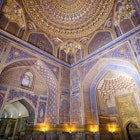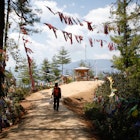

The magnificent seven-tiered pyramid at Koh Ker, Cambodia is one of the new additions to Unesco’s list of World Heritage sites © long lysong / Shutterstock
Spanning five continents, the newest entries on Unesco’s list of World Heritage sites celebrate natural treasures and human ingenuity.
A Viking Age fortress in Denmark, a Silk Road corridor in Uzbekistan and an elephant stronghold in the Congo: the 42 new destinations and five extensions added to Unesco’s list of World Heritage sites in 2023 celebrate natural wonders and cultural creations around the globe, ensuring their protection for future generations.
The finalized list was announced September 25, following two weeks of deliberations among World Heritage Committee members who gathered in Riyadh, Saudi Arabia, to discuss 50 nominations submitted throughout 2022 and 2023. There are now 1199 Unesco World Heritage sites spread across 168 countries.

Understanding Unesco’s World Heritage list
A specialized branch of the UN, the United Nations Educational, Scientific and Cultural Organization is tasked with promoting global peace and unity through “cooperation in education, sciences, culture, communication and information.” The concept of World Heritage was developed to identify, protect and preserve sites of cultural and natural significance considered to be of “outstanding universal value to humanity.”
According to Unesco, inclusion on the World Heritage List demands that a site meets one of 10 criteria, such as representing “a masterpiece of human creative genius” or containing “superlative natural phenomena.”
Unesco’s endorsement often benefits destinations – inspiring tourism, bringing prestige and committing countries to protect sites within their jurisdiction. If a World Heritage site begins degrading due to struggles from natural disasters, war or underfunding, Unesco-designated destinations can use money contributed by participating countries for emergency relief.
The power of the World Heritage platform saved Cambodia’s Angkor Archaeological Park from pillaging, blocked a dam proposal above Africa’s Victoria Falls and generated restoration assistance for Dubrovnik following damage caused by artillery fire during the Croatian War.
But World Heritage status can also be a curse, potentially driving overtourism and its negative effects. Italian writer Marco d’Eramo, in an essay for the New Left Review, dubbed this destruction “Unesco-cide” – the poison that turned San Gimignano, a tiny Tuscan town, from a charming local enclave to “a set for a medieval costume movie.”
Still, the benefits often outweigh the drawbacks. Unesco’s stamp of approval provides nations with a blueprint for protecting their most beautiful sites and travelers with a road map for finding the world’s wonders.

Exciting additions to the World Heritage List
This year’s new sites span five continents, including ancient dwellings, centuries-old architecture and essential ecosystems.
The addition of Koh Ker, capital of the Khmer Empire from 928 to 944 CE, reflects Unesco’s commitment to support the preservation of Cambodia’s cultural heritage. Koh Ker is home to Prasat Thom, Southeast Asia’s only seven-tiered pyramid, which stands among an ensemble of temples and shrines decorated with sculptures and paintings. The site makes for a dynamic day trip from Siem Reap, home of Angkor Wat.
In Guatemala, the inclusion of pre-Hispanic stronghold Tak’alik Ab’aj celebrates the birthplace of Mayan culture and honors Indigenous groups who still visit the sacred site to perform rituals.
Adding Ethiopia’s Bale Mountains National Park to the list acknowledges the landscape’s unique biodiversity while safeguarding its rivers, which supply water to millions of people in Ethiopia and beyond.
Bale Mountains is one of five new sites added in Africa, helping the continent reach a notable milestone: 100 destinations on the World Heritage List. Still, the continent only accounts for roughly 9% of World Heritage sites, a number Unesco is making concerted efforts to increase. During deliberations, members of the World Heritage Convention adopted a strategy to support African states in conserving sites and creating World Heritage nomination files.

Controversial inclusions
Despite the international acclaim of a World Heritage designation, not all sites receive unanimous praise.
This year’s inclusion of prehistoric ruins near the West Bank city of Jericho, one of the world’s oldest continually inhabited settlements, stoked Israeli-Palestinian tensions. Unesco listed the site, Tell es-Sultan, as located in Palestine – although Israel controls the territory and doesn’t recognize the Palestinian state.
Palestinians see the site’s World Heritage status as an important recognition of their identity; far-right Israelis see the decision as a political dig. (Israel withdrew from Unesco in 2019, citing anti-Israeli bias.)
Protecting World Heritage sites
In addition to new sites, the committee added two places in Ukraine to its so-called “Endangered List”: Kyiv’s St Sophia’s Cathedral and the historic center of Lviv. Unesco cited Russia’s ongoing invasion as the reason for their addition.
“Faced with the risk of direct attack, these sites are also vulnerable to the shock waves caused by the bombing of the two cities,” Unesco wrote in a statement. Inclusion on the list will help Ukraine receive financial and technical aid.

The complete list of new and extended World Heritage sites
Here’s the full list of new Unesco additions for 2023, by continent:
New Unesco sites in Africa
The Gedeo Cultural Landscape, Ethiopia
Forest Massif of Odzala-Kokoua, Congo
Koutammakou, the Land of the Batammariba, Benin and Togo
Andrefana Dry Forests, Madagascar
Djerba, Tunisia
Memorial sites of the Genocide: Nyamata, Murambi, Gisozi and Bisesero, Rwanda
Bale Mountains National Park, Ethiopia
Nyungwe National Park, Rwanda
New Unesco sites in Asia
Cultural Landscape of Old Tea Forests of the Jingmai Mountain in Pu’er, China
Deer Stone Monuments and Related Bronze Age Sites, Mongolia
Gaya Tumuli, Republic of Korea
Gordion, Turkey
Koh Ker, Cambodia
Santiniketan, India
Silk Roads: Zarafshan-Karakum Corridor in Tajikistan, Turkmenistan and Uzbekistan
The Persian Caravanserai, Iran
Ha Long Bay - Cat Ba Archipelago, Viet Nam
Hyrcanian Forests, Azerbaijan and Iran
Ancient Jericho/Tell es-Sultan, State of Palestine
Cultural Landscape of Khinalig People and “Köç Yolu” Transhumance Route, Azerbaijan
Sacred Ensembles of the Hoysalas, India
The Ancient Town of Si Thep and its Associated Dvaravati Monuments, Thailand
Wooden Hypostyle Mosques of Medieval Anatolia, Turkey
Cold Winter Deserts of Turan, Kazakhstan, Turkmenistan, Uzbekistan
Tugay forests of the Tigrovaya Balka Nature Reserve, Tajikistan
’Uruq Bani Ma’arid, Saudi Arabia
The Cosmological Axis of Yogyakarta and its Historic Landmarks, Indonesia
New Unesco sites in Europe
Jewish-Medieval Heritage of Erfurt, Germany
Modernist architecture (1919–39) of Kaunas, Lithuania
Old town of Kuldīga, Latvia
Prehistoric Sites of Talayotic Menorca, Spain
Viking-Age Ring Fortresses, Denmark
Žatec and the Landscape of Saaz Hops, Czechia
Astronomical Observatories of Kazan Federal University, Russian Federation
Eisinga Planetarium in Franeker, Netherlands
Funerary and memory sites of the First World War (Western Front) in Belgium and France
The Maison Carrée of Nîmes, France
Zagori Cultural Landscape, Greece
Evaporitic Karst and Caves of Northern Apennines, Italy
Historic Centre of Guimarães and Couros Zone, Portugal
New Unesco sites in North America
Tak’alik Ab’aj, Guatemala
Tr’ondëk-Klondike, Canada
Volcanoes and Forests of Mount Pelée and the Pitons of Northern Martinique, France
Hopewell Ceremonial Earthworks, United States of America
Anticosti, Canada
New Unesco sites in South America
ESMA Museum and Site of Memory – Former Clandestine Center of Detention, Torture and Extermination, Argentina
Jodensavanne Archaeological Site: Jodensavanne Settlement and Cassipora Creek Cemetery, Suriname
Explore related stories




 Festivals & EventsChristmas dinners around the world: choose your favorite festive dishes
Festivals & EventsChristmas dinners around the world: choose your favorite festive dishesNov 22, 2024 • 5 min read

 AstrotourismCopy My Trip: Exploring Uzbekistan's cities, deserts and mountains
AstrotourismCopy My Trip: Exploring Uzbekistan's cities, deserts and mountainsNov 21, 2024 • 5 min read




